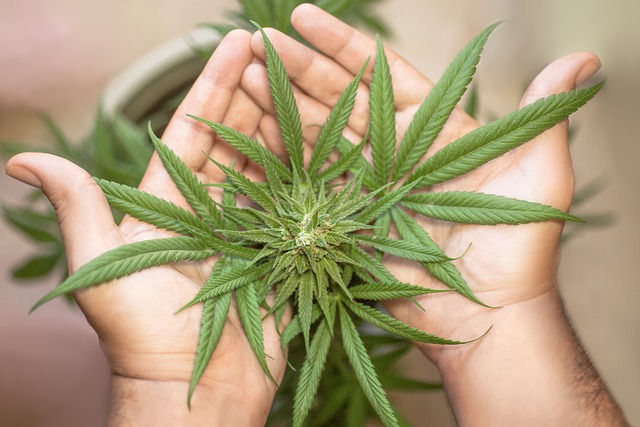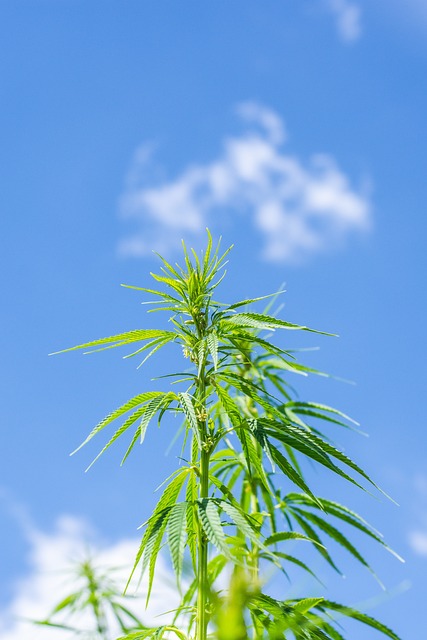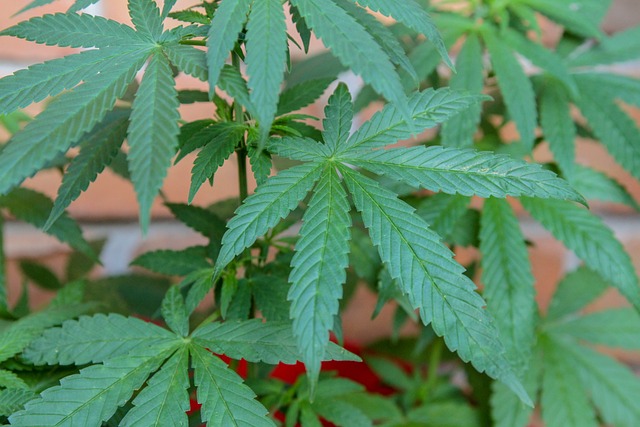2023 has seen THCA, the non-psychoactive precursor to THC and a key component of Cannabis sativa, gain scientific attention for its potential health benefits, including anti-inflammatory and neuroprotective effects. In California, which has taken a progressive stance on cannabis regulations, THCA is fully legal under both medicinal and adult-use laws. The state's comprehensive regulatory framework, such as the Cannabis Regulation and Safety Act (CRSA), outlines the production and consumption of THCA-rich products, with specific guidelines that differentiate raw cannabis flowers from processed hemp products to ensure consumers do not inadvertently consume psychoactive THC. This distinction is critical for maintaining a clear separation between THCA's legal status as a non-psychoactive substance and its transformation into THC when heated. California's leadership role in the cannabis industry has established it as a significant market for THCA-based products, with implications for producers and users alike. The state's focus on safety, legality, and innovation positions it at the forefront of research into THCA's therapeutic properties and potential applications in cancer treatment, making it a key area for the exploration of cannabis science and commerce.
Discover the transformative potential of THCA flower, a cannabinoid-rich cultivar gaining prominence within California’s burgeoning cannabis industry. This article delves into the multifaceted nature of THCA, its legal standing in the Golden State, and the intricate chemistry that sets it apart from its psychoactive counterpart, THC. From understanding how THCA flower is cultivated to exploring its potential therapeutic properties, this comprehensive guide navigates the myriad aspects of THCA, both medicinal and recreational, within California’s regulatory framework. As THCA emerges as a leading player in the cannabinoid landscape, learn to discern quality products, recognize its effects, and responsibly engage with its offerings. Whether you’re a seasoned consumer or new to the world of cannabinoids, this article provides an enlightening overview of THCA flower, its impact on the economy, and its role in shaping future cannabis policy reforms in California.
- Understanding THCA: The Natural Precursor to THC
- THCA Flower: A Glimpse into Its Emergence in the Cannabis Market
- THCA Legal Status: California's Regulatory Framework
- The Chemistry of THCA: Structure, Properties, and Potential Benefits
Understanding THCA: The Natural Precursor to THC

Delta-9-tetrahydrocannabinolic acid, commonly known as THCA, is a naturally occurring cannabinoid found in the Cannabis sativa plant. It’s the precursor to THC, the psychoactive compound that is well-known for its effects when cannabis is smoked or vaporized. As of my knowledge cutoff in 2023, THCA itself is non-psychoactive and has been gaining attention for its potential therapeutic properties. Researchers are exploring the various benefits associated with THCA, including its anti-inflammatory and neuroprotective effects.
The legal landscape regarding cannabinoids can be complex, with laws varying by state and country. In California, both medicinal and adult-use cannabis are legal, which includes products containing THCA. The legality of THCA in California aligns with the broader state regulations that allow for a variety of cannabis-derived products to be legally sold, provided they comply with state laws and local ordinances. Consumers in California have access to raw cannabis flowers, extracts, and edibles containing THCA, offering a range of choices for those interested in exploring the potential wellness benefits of this cannabinoid. As such, the thca legal in California status is an important aspect for both producers and consumers within the state’s regulated market.
THCA Flower: A Glimpse into Its Emergence in the Cannabis Market

As the cannabis landscape evolves, THCA-rich flowers have gained significant attention within the industry, particularly in regions where their cultivation and possession are legally permitted, such as California. Tetrahydrocannabinolic acid (THCA) is the raw, non-psychoactive precursor to THC, the primary psychoactive component of cannabis. The emergence of THCA flower in the market represents a new frontier for consumers and researchers alike, offering potential therapeutic benefits without the immediate psychoactive effects associated with its decarboxylated counterpart, THC. In California, where medical and adult-use cannabis markets are well-established, the availability of THCA flower has expanded, providing a legal avenue for individuals to explore this unique compound’s potential health benefits. The interest in THCA stems from anecdotal reports and early research suggesting its anti-inflammatory, neuroprotective, and analgesic properties, making it a subject of intrigue for those seeking alternative wellness solutions. As the regulatory framework continues to mature, THCA flower’s role within the cannabis industry is set to become more defined, with potential implications for both recreational and therapeutic use. This shift underscores the dynamic nature of cannabis science and commerce, reflecting an ongoing commitment to innovation and consumer choice in legal markets like California.
THCA Legal Status: California's Regulatory Framework

California has a complex and evolving regulatory landscape when it comes to THCA, which is tetrahydrocannabinolic acid, a non-psychoactive precursor to THC found in raw cannabis. The legal status of THCA in California is defined within the state’s Cannabis Regulation and Safety Act (CRSA) and its accompanying regulations. Under California law, industrial hemp containing less than 0.3% THC on a dry weight basis was federally legalized under the 2018 Farm Bill, and this has had implications for the production and use of THCA-rich products.
The California Department of Public Health (CDPH) provides guidelines that differentiate between consumable hemp products and raw cannabis plants. Raw cannabis flowers containing THCA are legal in California as long as they are not processed or consumed in a manner that activates the THC within them. This distinction is crucial for consumers and manufacturers, as it allows for the legal use of THCA-rich products without the psychoactive effects associated with THC. The state’s regulatory framework also includes strict licensing requirements for commercial cultivation, processing, and distribution of cannabis products, ensuring that THCA products in California are held to high standards of safety and legality. It is imperative for businesses operating within this space to stay abreast of the changing regulations to ensure compliance and adherence to the law.
The Chemistry of THCA: Structure, Properties, and Potential Benefits

delta-9-tetrahydrocannabinolic acid (THCA) is the non-psychoactive precursor to the well-known psychoactive compound delta-9-tetrahydrocannabinol (THC). Found abundantly in raw cannabis flowers, THCA possesses a unique chemical structure that distinguishes it from both itself and its psychoactive counterpart. This structural difference results in THCA having different properties and potential benefits compared to THC. The THCA molecule contains an additional pentyl ring at the carbon position 9, which, upon heating or combustion, is decarboxylated to produce THC. This transformation alters the compound’s effects and interactions with the body’s endocannabinoid system.
Though THCA is legal in California under Proposition 64, which allows for the recreational use of cannabis and its derivatives, THCA itself remains a subject of considerable scientific interest due to its potential therapeutic properties. Research suggests that THCA may offer anti-inflammatory, neuroprotective, and analgesic effects, without the psychoactive ‘high’ associated with THC. This has led to an increasing number of cannabis consumers in California exploring THCA-rich products for various health concerns, including inflammation and neuropathic pain. The interest in THCA also stems from its potential role in cancer treatment, as preliminary studies indicate it may inhibit the growth of certain types of tumor cells. As such, the chemistry of THCA, particularly its structure, properties, and potential health benefits, continues to be an area of active research, with significant implications for both medicinal and recreational cannabis users in California.
In recent times, THCA flower has garnered significant attention within the cannabis community, particularly in California. As an in-depth exploration of this emerging phenomenon reveals, THCA, the natural precursor to THC, presents a unique opportunity for those interested in the potential benefits and legal nuances of cannabinoids. The state’s regulatory framework, which governs THCA legal status in California, has evolved to accommodate this evolving market, ensuring safety and clarity for consumers. The chemistry of THCA offers intriguing insights into its structure and properties, setting the stage for a deeper understanding of its role within the cannabis ecosystem. For those intrigued by the therapeutic potential and the legal aspects of THCA flower, California serves as an informative and accessible frontier in this burgeoning field.
